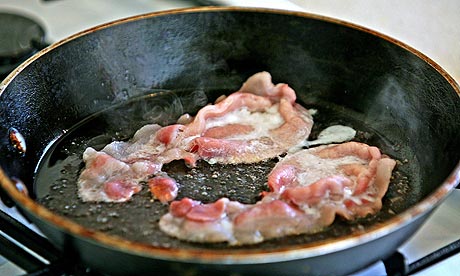
Eating processed meats, such as bacon, ham and sausages, can increase the risk of heart disease and diabetes, research suggests.
Processed meats are already linked to a higher chance of developing bowel cancer but a round-up of research has now shown a link with other conditions.
A review by the Harvard School of Public Health examined 20 worldwide published studies involving more than a million people. It found a 42% higher risk of heart disease and a 19% increased risk of type 2 diabetes for each daily serving, on average, of 50g of processed meat. A 50g serving is roughly equivalent to two rashers of bacon or one hot dog.
Unprocessed red meats, such as beef, pork or lamb, do not raise the risk. Researchers believe the levels of salt and preservatives in processed meat could explain the disparity.
The study defined processed meat as any meat preserved by smoking, curing or salting, or with chemical preservatives added to it. Such meats include bacon, salami, sausages, hot dogs and processed deli or luncheon meats.
Writing online in the journal Circulation, the authors said: "Consumption of processed meats, but not red meats, is associated with higher incidence of coronary heart disease and diabetes mellitus (type 2).
"These results highlight the need for better understanding of potential mechanisms of effects and for particular focus on processed meats for dietary and policy recommendations."
The authors said that studies had until now shown an inconsistent link between meat, heart disease and diabetes.
They found the effects held true even when lifestyle factors were taken into account.
Lead author. Renata Micha, a research fellow in the department of epidemiology, said: "When we looked at average nutrients in unprocessed red and processed meats eaten in the United States, we found that they contained similar average amounts of saturated fat and cholesterol.
"In contrast, processed meats contained, on average, four times more sodium and 50% more nitrate preservatives.
"This suggests that differences in salt and preservatives, rather than fats, might explain the higher risk of heart disease and diabetes seen with processed meats, but not with unprocessed red meats."
Salt is known to increase blood pressure, which in turn increases the risk of heart disease.
Studies on animals have shown that nitrate preservatives can cause a buildup of hard deposits in the arteries and reduce the body's ability to handle sugars, which can increase the risk of heart disease and diabetes.
"To lower risk of heart attacks and diabetes, people should consider which types of meats they are eating," said Micha.
"Processed meats such as bacon, salami, sausages, hot dogs and processed deli meats may be the most important to avoid.
"Based on our findings, eating one serving per week or less would be associated with relatively small risk."
Two rashers of bacon a day throughout life has been linked to a 20% increase in the risk of developing bowel cancer.
Men in the UK eat an average of nearly 50g of processed meat a day compared with just 24g for women, research has shown.
The average person has a risk of bowel cancer of five in 100, but this rises to six in 100 if they eat an extra 50g of processed meat per day, according to the World Cancer Research Fund (WCRF).
Their scientists estimate that about 10% of the 37,000 new cases of bowel cancer in the UK each year could be prevented if everyone ate less than 70g of processed meat a week – roughly three rashers of bacon.
Victoria Taylor, senior heart health dietician at the British Heart Foundation, said red meat could form part of a healthy, balanced diet if properly prepared.
"Go for lean cuts and aim to cook from scratch using healthier cooking methods like grilling or baking," she said.
"If you need to add flavour, then try using fresh and dried herbs, spices and chilli instead of salt."

